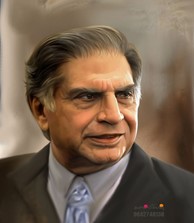Blog Details
8. The Tata Way: How Ratan Tata Turned Challenges into Business Opportunities

Ratan Tata, the People's Industrialist Whom India Will Adore & Admire Forever
In the realm of dreams, aspiring entrepreneurs often find themselves standing at a crossroads, their hearts filled with passion yet clouded by fear. The desire to create and innovate burns brightly within them, but the daunting prospect of taking that first step can feel overwhelming.
As they wrestle with self-doubt, it’s important to remember the words of Ratan Tata: “I don't believe in taking right decisions, I take decisions and then make them right.” This powerful reminder encourages them to embrace uncertainty and understand that every journey begins with a single step. With courage and determination, these dreamers can turn their visions into reality, illuminating the path for others to follow. One such dreamer who epitomizes this spirit is RATAN TATA.
The Life and Legacy of Ratan Tata
In the realm of business legends, few stories resonate as powerfully as that of Ratan Tata—a visionary leader who transformed challenges into triumphs. This blog invites you to explore the obstacles he faced, the bold decisions he made, and the remarkable successes that followed. Join us as we unravel the inspiring narrative of how Ratan Tata not only overcame adversity but also redefined the landscape of Indian industry, leaving an indelible mark on the world. Get ready to be inspired.
Early Life and the Beginnings of Ratan Tata’s Business Journey
Ratan Tata was born into one of India’s best-known and wealthy families—the Tata family. But even with his wealthy upbringing, he never took achievement for granted. Ratan Tata studied at Cornell University and Harvard Business School before returning to India in 1961 to join the Tata Group.
In his early years at the company, Ratan Tata had a variety of positions, including shop floor manager and business expert. His early years of hands-on experience gave him a solid understanding of the difficulties Ratan Tata’s business faces. Ratan Tata faced early opposition from some in the Tata Group, but his constant dedication and creative thinking helped him gain respect over time.
The Marketing Strategy Behind Tata’s Success
The way that Ratan Tata approaches marketing is among the most interesting parts of his success story. Ratan Tata’s company has always been based on innovation, trust, and customer-centricity. These principles were carefully incorporated into the business’s marketing plans, developing the company’s relationship with customers and enhancing its position internationally.
1. Global Expansion and Strategical Acquisitions
He ventured into the car market in 1998 and introduced his first model, the Tata Indica. However, the launch was a failure as it did not attract buyers' interest at the time.
In 1999, he even considered selling the entire company and approached Ford Motors for a potential deal. However, during the discussions, Tata, despite being the head of such a large conglomerate, faced humiliation from the Ford executives. This was an incredibly distressing and frustrating experience for an entrepreneur of his stature.
Ford insulted Ratan Tata by stating “When you don’t know anything about passenger cars, why did you start the business”. These words were promptly replied by Ratan Tata when he saved Ford from bankruptcy.
At a time when Ford was facing significant financial challenges and looking to divest its non-core assets, Tata saw an opportunity to enhance Tata Motors' global portfolio by acquiring the struggling Jaguar and Land Rover brands from Ford.
This is a great example of how Ratan Tata transformed Jaguar from a struggling brand into a thriving success story by investing in innovation, enhancing quality, and revitalizing its iconic heritage, proving that with vision and determination, even the most challenged brands can soar to new heights.
2. Innovation in Technology
During his tenure, Ratan Tata faced significant challenges with Tata Consultancy Services (TCS), particularly in a fiercely competitive IT landscape dominated by global giants. To address this, Tata prioritized a strong corporate culture and implemented extensive training programs, fostering loyalty and making TCS an employer of choice.
Additionally, as the company sought to expand globally, navigating diverse regulatory environments and cultural differences was crucial. He also recognized the need for technological innovation and championed investments in emerging fields like artificial intelligence and cloud computing.
By positioning TCS as a partner capable of delivering cost-effective, cutting-edge solutions, Ratan Tata not only overcame these challenges but transformed TCS into one of the leading IT services firms in the world, showcasing his ability to turn obstacles into remarkable business opportunities.
3. Philanthropy as a Marketing Strategy
Ratan Tata believed that a successful firm should also give back to society in addition to making money. His dedication to charitable giving is a fundamental element of the Tata Group’s marketing plan. Ratan Tata’s company is strongly linked to corporate social responsibility (CSR) programmes, which have improved the brand’s reputation and encouraged consumer goodwill.
The Tata Group has undertaken many charitable projects, which include environmental sustainability and rural development to healthcare and education. In addition to helping communities, these actions have improved Tata’s standing as a socially conscious business. Unquestionably, Ratan Tata’s passion for “nation-building” has been important in the success of his corporate marketing approach.
Creating Value Beyond Profit: The Role of Social Responsibility in Business
Ratan Tata carried forward the legacy of the Tata group’s founder, Jamsetji Tata. The JN Tata Endowment for Higher Education provides scholarships to Indian students for pursuing higher education. TATA Trusts has been working towards addressing the challenges in the education sector, with a focus on providing quality education to children from marginalized communities.
He has also been actively involved in various philanthropic projects, including initiatives that support animal welfare. One notable example is his association with Motopaws, an organization that manufactures reflective collars for stray dogs to enhance the visibility of street dogs, especially at night, reducing the risk of road accidents and improving their safety in urban environments.
Resilience and Recovery: The Taj Hotel Attack
Ratan Tata's response to the Mumbai Taj Hotel attack in 2008 stands as a testament to his leadership and commitment to resilience. Amid the attack, Ratan Tata, who was then 70, showed tremendous resolve as he stood at the Colaba end of the iconic Taj Hotel, while security forces carried out operations against the terrorists. The attack claimed the lives of 166 people, including 33 who died in the 60-hour siege at the Taj Hotel, of which 11 were hotel employees. After the attack, Rata Tata pledged to reopen the Taj Hotel and also to take care of the families of those killed or injured in the attack. As reported by the BBC, Tata ensured that the families of the deceased would receive the salaries their loved ones would have earned for the rest of their lives.
The Tata Nano: A Small Car with a Big Vision
With Tata Nano, which was popularly known as the ₹1 lakh car, he aimed to turn the populace into car owners. The decision, however, did not turn out to be a massive success story as hoped by Tata Motors. Ratan Tata, however, said that he was still proud of the car.
“I remember seeing a family of 4 on a motorbike in the heavy Bombay rain — I knew I wanted to do more for these families who were risking their lives for lack of an alternative. By the time we launched the Nano, our costs were higher, but I had made a promise, and we delivered on that promise… Looking back, I’m still proud of the car and the decision to go ahead with it,” Ratan Tata told Humans of Bombay in 2020.
However, despite its innovative engineering and low price point, the Nano faced several hurdles. Issues such as safety concerns, quality perceptions, and negative publicity—exacerbated by a tragic incident involving a Nano catching fire—led to scepticism among potential buyers. Let’s remember not to dismiss any entrepreneur or their innovative ideas too quickly, as we did with Ratan Tata's Nano project; every vision has the potential to transform industries and lives if given the chance to flourish.
Learning from Ratan Tata’s Playbook
To all aspiring entrepreneurs, remember that the path to success is often paved with challenges and uncertainties, just like Ratan Tata faced throughout his remarkable journey. Let his story inspire you to embrace your dreams fearlessly and pursue them with unwavering determination. Don't let fear hold you back; instead, harness it as a catalyst for innovation and resilience. With passion, perseverance, and a vision, you too can turn your dreams into reality and leave a lasting impact on the world.
Together, we can cultivate a vibrant ecosystem where innovation thrives, and the next generation of entrepreneurs can shine brightly. So, dream boldly, take that leap, and let your journey begin!
Copyright | All Rights Reserved H M R R & Associates























